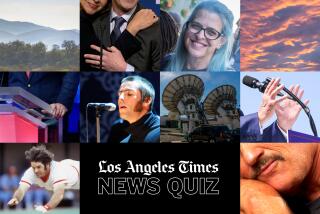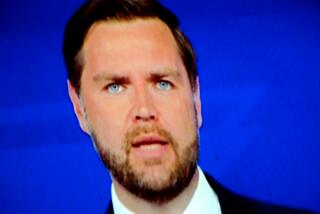The Debates: Throw Away the Score Card
- Share via
The program was “Today,” the speaker NBC News Washington bureau chief/commentator Tim Russert, the topic Bill Clinton’s behavior on a recent “Donahue.”
When pressed at length by Phil Donahue about Republican-generated innuendo regarding his visit to the Soviet Union as a college student, “Clinton went bonkers,” Russert insisted.
Bonkers, meaning berserk?
Clinton was clearly irritated by Donahue’s line of questioning, and he made his feeling known. But. . . .
“ Bonkers is a little bit much,” “Today” co-host Bryant Gumbel correctly noted to Russert.
The point is not that the Clinton described by Russert did not square with the Democratic candidate’s actual behavior on “Donahue,” but that, depending on their eyesight and mind sets, even experienced journalists whose job is to accurately report what they see can interpret the same set of facts differently.
Keep that in mind Sunday.
That is when President Bush, Clinton and Ross Perot will be quizzed by a panel of journalists in the first of their three, 90-minute, televised confrontations, otherwise known (loosely) as debates.
If tradition holds, immediately after Sunday’s event in St. Louis, network analysts will tell you what you saw and heard. They’ll total their score cards and tell America who won and who didn’t, who looked good and who didn’t, who looked presidential and who didn’t.
Engaging in this babbling, knee-jerk journalese is simplistic and convenient, creating a handy peg on which to hang a breaking story. But here’s a plea to the networks:
Don’t do it!
“Which candidate actually wins the debate? That’s a press construct that distracts from the substance of the debate,” Kathleen Hall Jamieson said by phone from the University of Pennsylvania, where she’s dean of the Annenberg School for Communications.
“Most debates are pretty even,” said Jamieson, who has written widely on presidential politics and debates. “The winner is the one who’s going to have more supporters watching.”
That is to say, viewers predisposed toward a particular candidate tend to believe that candidate did best. The same applies to journalists, who have their own preconceptions based on the sum of their accumulated, life-long experiences.
Thus, calling winners and losers “is a silly thing” for the media to do, Jamieson said. And potentially dangerous, given the possibility that a significant number of viewers will be swayed by this punditry, and that their views will be subsequently reflected in the polls. And if the polls reflect more favorably on a particular candidate, Jamieson notes, some of those who thought the other candidate had won may change their minds based on those polls.
“The larger question,” she said, “is whether that affects votes. We don’t know. At best, we can tell this is a very complex and interactive process.”
Complexity is rarely the concern of television journalists when called upon to make snap judgments in the moments following a debate that may itself be a meaningless verbal joust that encourages superficiality.
On the one hand, there is the ideal.
“The debates are an important form of discourse,” Jamieson said. “We should be evaluating the candidates’ ability to argue and structure claims in a cogent fashion, and how well they represent the opposing view. These are useful skills in assessing how someone will govern. After all, persuasion is an important part of the presidential office.”
On the other hand, there is the reality. Unlike the Oval Office, where we expect decisions to be made in a thoughtful manner after the weighing of many options, TV debates favor the hair-trigger one-liner over contemplation. Reflection is the kiss of death. The candidate who dallies longer than five seconds before answering is immediately indexed in our memories under foggy and indecisive. To say nothing of inept.
Sunday’s format, with the candidates being questioned by a panel of journalists selected by the campaigns, is especially conducive to shallowness. “The format rewards glibness over factualness,” Jamieson said. “It also rewards the person who is able to articulate complex ideas simplistically. That is why I favor the moderator format.”
That format, recommended by the bipartisan Commission on Presidential Debates but resisted by the Bush campaign, will be used for Tuesday’s televised vice-presidential debate. A modified version--with candidates being questioned by a moderator and members of a studio audience--will be employed for Thursday’s Bush-Clinton-Perot appearance. The final presidential debate on Oct. 19 will split the difference, going half way with a moderator, the other half with a panel of journalists.
Regardless of the format, there’s little likelihood of it affecting the conduct of TV’s post-debate analysts, who, if history is served, will do what they always do on these occasions.
Go bonkers.
POOH ON PEROT? “The perils of Perot.” That was a CBS reporter’s demeaning description of Perot’s series of half-hour ads listing the nation’s economic woes. And “Today” host Gumbel wore a smug grin throughout a recent split-screen interview with Perot, as if the candidate were someone deserving of ridicule by the media now that his support appears to have significantly diminished.
“When there’s a gap in the polls, the press sabotages the person who’s behind, making (that candidate’s) dialogue less important,” Jamieson said. “But now that you have three candidates who will look co-equal in the debates, reporters will run the risk of looking venal if they attack Perot.”
Based on recent performance, it’s a risk many reporters will be prepared to take.
More to Read
Get the L.A. Times Politics newsletter
Deeply reported insights into legislation, politics and policy from Sacramento, Washington and beyond. In your inbox twice per week.
You may occasionally receive promotional content from the Los Angeles Times.










